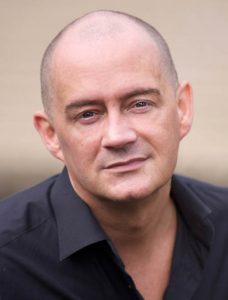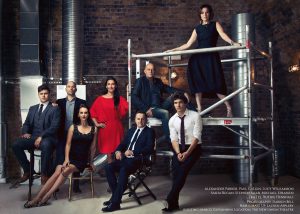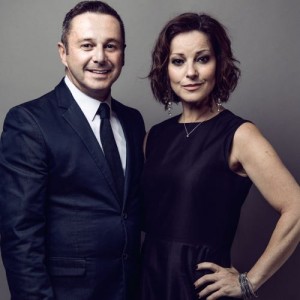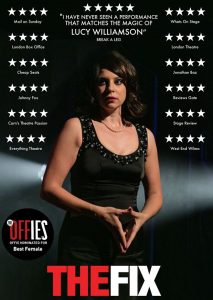
Michael Strassen is synonymous with exciting, engaging and high quality productions at the Union and after being blown away The Fix I couldn’t wait to give him a call and chat about the past, the future… and the one show he’s love to do if given the opportunity!
Cheap Seats: You’ve just finished up The Fix at the new Union Theatre, did you feel any pressure that you were laying down the benchmark for shows in the new space?
Michael: Was there any pressure? Yes and no…Obviously any new space is like a birth so I wanted to get it done in time, for Sasha (Regan – founder of the Union Theatre). I wanted the building to open without any major problems, cancellations, missed previews or drama.
So, yes the building was essentially ready, Ian had worked very hard on the lighting and that was all up… it’s always difficult when a lot of things come together at the same time. Usually the theatre is ready and things happen in a certain order, but with the opening of the new theatre everything happened at the same time so I had to be a little bit of a Hitler and make sure I held my nerve, make sure it was all fine… which it was!
photo by Darren Bell
You’ve directed quite a few shows at the Union now, what is it about that space, Sasha and her team that makes you keep returning?
Sasha, who is a wonderful facilitator and supporter of young talent and vital to a growing industry, doesn’t have to play by the normal rules; I can do shows there that I couldn’t normally do in a commercial setting and yet still sell out the show and, just about, make it commercially viable. We paid wages on the first show at the Union which was a very good thing to do!
I get to play at the Union and get to do a very varied palette of work… I get to experiment, I get to expand – it’s where I built my brand as a director and Sasha has accommodated that which I’m very thankful for.
We couldn’t have gone back to The Fix without Alex Parker either. He’s an exciting young producer and worked amazingly hard to raise the monies for the production.
You say you’ve built a brand at the Union – you directed the Fix previously in the old space. What was it that made you want to revisit it? Was it timing or did you feel you had more you wanted to do with the show?
I just thought the show worked extremely well previously but contextually and politically it was just the right time. The more I watched the news the more I felt I’ve just got to do something, I’ve got to do this again!
I also wanted to do something that was already branded extremely well by the Union… basically though I turned on the news and thought “It’s time to do The Fix again”. When it was originally written it was poignant, but by this time we’ve got Trump and all the shenanigans going on politically I just felt this was ripe to do again.
A little too close to the truth at the moment I guess?
Yeah, it’s one of those rare things where a piece of theatre really does reflect back on society. Also, it’s fun, it’s dark, and it’s tragic. It ticks a lot of boxes that people look to the Union for – impact, laughter, it’s very moving. It was many shows in one, rather than doing something like Pacific Overtures again which is very beautiful but ticks one box whereas The Fix ticked about five. I actually just think it was a good opening choice!
Extremely well received too! The Fix was well received before but it was noted this time that you ended up with a poster that had more stars than the American flag and you had the likes of Cameron Mackintosh in the audience while Dana P. Rowe (composer of The Fix) raved about the production on Social Media. It must be incredibly rewarding to get that sort of reception!
Well it’s always nice when the writers are still alive! It’s quite a rarity when you actually think about it.
For a director it’s a great thrill when the writers can come. John Dempsey (lyricist for The Fix) came over and was mentioned to say it was the first time he had ever cried at seeing his word spoken on stage, which I assume was the more impactful stuff in act two.
Dana said he’d heard his heart sing on stage… it’s just a really lovely experience when a writer can come and solidify your vision on what they’ve done. Basically it’s their work, they wrote it and what I do is basically my opinion on letters they’ve written. So yes, it was fantastic!
As for Cameron coming… Cameron never goes to see stuff so we didn’t push it. I knew that he really likes the show a great deal and this was a very new tack on it so rather than bug the man we just though, what’s the saying? “If you build it, they will come”. We built it… and he did, the man from Del Monte said yes!
You talk about it being lovely when the writers can be a point of contact. You’ve worked with Stephen Sondheim in the past which must be the pinnacle for anyone working in theatre and specifically musical theatre. You’ve also directed some of his work. How much did you take from your time with him to put back in when you directed Pacific Overtures and Assassins?
I think having worked with and met him – and he’s such a gentle, generous genius of a man – you realise that certain works, certain things don’t need pushing. Stephen Sondheim’s work does not need any help, but what it does need is a mirror.
You house Sondheim’s work, you don’t present it. It’s a bit like Shakespeare – if you present Shakespeare it becomes terribly archaic and wooden. His work I try to bring to life as opposed to “Ooh, look at this fantastic idea!” You always need an idea to make something work, but there’s nothing worse than bad Sondheim, than bad Shakespeare and so I always avoid… I try to get myself out of the way and let the work speak for itself.
That’s really interesting. I love Shakespeare and for me it’s about letting those beautiful words speak… Sondheim for me is as close as we can be to the Shakespeare of Musical Theatre.
It really is exactly the same thing, you know you can look at someone and go (Michael over stresses each syllable) “How you have to finish the hat.” (if you don’t recognise the line, it’s from Sunday In The Park With George) you don’t need to aid it. You line your actors up. It’s about getting your actors into the right mental sphere and if you do that the work pours through them. The human mammal, when you take all the shit away from it just knows how to act. Obviously the craft is under there so it’s audible – it’s craft an talent isn’t it? They’re the two things. If you get actors with good craft and you line them up well then you’ll get a nice spectrum.
Works other than Sondheim, yes they do need a little bit of a jig, a little help with under or over colouring here and there, a little help with pace, but he isn’t one of them.
You’re best known now as a director and choreographer but you’ve done a lot of onstage work as well, on tour and in the West End. Do you consider yourself purely a director now or are you still interested in being onstage? Is there anything that would tempt you back to performing?
No, I very much doubt it. I consider myself a director now. I really hate the word choreographer being attached to my name because I consider what I do to be musical staging, it’s an extension of the lyric and the music. I have friends who are choreographers who are beyond brilliant. If I ever did anything that required what I call true choreographic cleverness I would use someone else but for shows like Company and Pacific Overtures where you’re literally just breathing movement within the lyric and music I like to do that but I consider that to be musical staging.
I think The Fix is the first time I’ve ever attached the word choreographer to what I did but then I did have the expert help of Iona Holland! She was fantastic and is one of the main reasons the show was as good as it was, as is Paul Callen who was the associate director. I often said if I was hit by a car on the way to rehearsal those two could get the show on!
It must be really important to have the right team around you. You worked with Mark Smith (choreographer and Artistic Director of Deaf Men Dancing) on Tommy. What’s the relationship like when you work with a choreographer?
I never leave the room when a choreographer is working so that the narrative of the show remains consistent. A choreographer will often just need one arm movement, one adjective, a verb… just to keep it within the context of the piece, so it leads from my musical staging into choreography, back into staging and into speech or song. It just keeps the line together.
I do often go and see musical productions and – I call it the moment I hear the bus land – that’s the moment I know the director left the room and another independent mind is now driving the show. Brilliant though it may be, it’s not part of the same narrative.
I think collaboration is everything, Tommy was one of the best collaborative moments of my career. Mark is a very clever boy and was the perfect choice for Tommy. When I was first offered the job I said “I’ve got to do this with Mark” and it paid off wonderfully.
You’ve worked with Mark, you’ve mentioned Iona and Paul… Is there anyone you’ve not worked with that you’d like to or are hoping to in the future?
Well, right back at the beginning when Ruthie Henshall asked me to stage and direct her first one-woman Gershwin show at Royal Festival Hall the choreographer was Stephen Mear. That was a long time ago… that was my first accidental spill into directing and I would dearly love to work with Stephen at some point.
You talked about Ruthie and I was going to ask: You’ve put together a couple of her performances and she’s a remarkable talent, it must be lovely to be able to work with someone who has that body of work and that spark that sets a stage alight!
A person like Ruthie Henshall comes around about every 50 years and that’s evident in her reviews for her work. It’s difficult to qualify what it is that makes her so… I hate the word special, so hypnotic – let’s use that word – I’ve seen Ruthie perform with influenza and still you cannot take your eyes off her! She adds colour to everything, you always get a sense that there’s a juggernaut behind her and you don’t know whether she’s going to jump out of the way of it or she’s going to allow that juggernaut to hit her square in the back. It’s that kind of charisma and presence that makes everything she says – I’m talking about plays as well, she’s done a good body of plays as well as musicals – so special. I think she’s moving into a completely new sphere in her career now, there are very exciting things ahead as she moves into those older female roles. I see Ruthie in some of the great classics later in her career… I’d love to direct her in Ibsen for example! She’s grown tremendously as a human being. I’ve known her many years from when we met in Miss Saigon and she’s grown tremendously into this incredible, wise creature. At the base level she’s just a phenomenal facility – you just insert her into a show or song, watch and go wow!
Mind you, ask her to qualify how she does it and she, like many great actresses, will struggle. I’ve often said to her if I explain it to her I might break the spell, so I never have. She’s just, quite simply, brilliant!
How different is it to direct a concert or cabaret as opposed to a more structured play or musical?
It’s a completely different animal. I’ve read comments – you know, you read comments on, lets say, Ruthie doing Send In The Clowns on television in concert as opposed to in the structure of the piece… she’s never done A Little Night Music, but you know what I mean… The big difference is that in cabaret the fourth wall is down and the relationship between the audience and the performer is different.
Also it requires the creation of a “self” whereby you are yourself on stage and you have to present that self. It’s something the likes of Ruthie, Bernadette Peters, Liza Minelli do very well. Those selves that they create on stage are for the sole purpose of punching through the fourth wall and saying “hi, this is me and this is what I have to say… and I know you’re there!”. That’s the big difference, we’re in the same room and we all know we’re there. In theatre we kind of pretend we’re not and that creates a completely different animal with a completely different interpretation and presentation.
You’ve mentioned Bernadette Peters and spoken about directing Ruthie. Are there any other performers you’d particularly love to work with?
Well I have to say I could work with Lucy Kemp for the rest of my life! She’s a real muse for my work and there’s a myriad of things I’d love to do with her. I consider her to be one of the biggest musical theatre talents in this country.
Other than that… I don’t do a great deal, but I do some work at drama school level and I tend to find one or two students a year who I nurture or encourage. These students might have an element of Ruthie, or Lucy and if I spot it I hone in, help them find agents, give them private coaching and their first job in an ensemble. I’ll introduce them to people socially.
So, yes there are but these are people you won’t know yet. Apart from that I don’t really want to… oh – Laura Pitt-Pulford I’d love to work with, I think she’s exceptional… Tracie Bennett I think is a world class actress… and Ria Jones of course who has been working consistently for many years and it’s taken this long for people to realise… she went on for Glenn Close and people went ouch! There’s a woman who can fill an opera house!
Absolutely. We were lucky enough to see Ria as Norma Desmond and it was stunning!
I didn’t see it but the thing is it’s about presence and energy… people think it’s about volume and there are certain elements of that but it’s not about how high the speaker is turned up but what the speaker is. It’s about charisma and also having the nerve to inhabit the now!
Being on stage is a bit like being in a train crash but being able to pretend you’re not and being in the absolute now. It’s like looking into the eyes of the baby and being absolutely present in the moment. People who can do that under such pressure are incredible.
I think for me a seminal moment in going from enjoying theatre to falling love with it was during the Lyceum production of Jesus Christ Superstar – which I believe you were in – and hearing Steve Balsamo sing Gethsemane.
I was! It’s a moment of pure theatre and those moments are becoming less and less as people’s expectations become less. If you’re making musical theatre where the only objective is to entertain then you’ll end up with a piece of entertainment and there’s nothing wrong with that.
The fact is though that the nature of theatre is not just to entertain but – like the moment you’ve just described – to inspire. You should leave a theatre thinking those people are super human, you shouldn’t leave thinking those people are your friend and you have to go to the stage door to meet your friends.
Theatres to me are temples, like churches we should go into them and leave wanting to be a better person or to wake us up to something!
That brings us on to what is next for you… you’re directing Pippin in Hong Kong. Have you directed abroad before?
I directed at a place called Royce Hall in Los Angeles, but this is my first time in the Far East. It’s a huge theatre with amazing facilities. I’ve been over twice, once to look at the three theatrical spaces to choose which one I wanted to do Pippin in and the second to cast the show. I’m involved in long Skype conversations, the set needs to go into pre-production very soon before I arrive so I’m busy talking to set and sound. I’ve got a wonderful MD coming over from Sydney and a great team!
Is there any thought toward directing for an audience with a different cultural background? Do you feel you need to change your approach or just let the piece speak for itself?
Yeah, I just do what I do. I am doing a sort of ‘Zen-ish’ take on it, which will be a lot of fun. It’s a very kind of white look, Pippin starts in a giant egg in the middle of the stage and hatches out with the chorus around him with their Fosse-esque white gloves but in this day and age they’ll be LED which will look fantastic in the dark. At the end of the show he walks out into the auditorium on an invisible plinth as it begins to snow and he looks up into blackout. It’s about transition, so I have changed it in a way to meet a more eastern ethos but it’s still the story of every man.
When that finishes are there any plans for what will be next on these shores?
I come back and I’m doing a very large commercial pantomime at De Montfort Hall in Leicester. I did the show there last year and this year I’m doing Jack and The Beanstalk and I’m very excited about the casting for that. I can’t tell you who it is yet other than we’ve got Sam Bailey from X-Factor who is playing Mama Morton in Chicago at the moment.
The rest of the casting is decided and it will be announced soon.
Pantomime is a strange beast in that it has to feel quite anarchic. Does that mean you have to plan it extra tightly or do you let some performers run wild?
I run as tight a ship on a pantomime as I do on a Sondheim. They’re very different but are very much their own art forms. Pantomime should appear to be the biggest, maddest bit of fun ever but it actually runs on a really tight rhythmic discipline. Yes of course if you get a highly talented comedian you let them do their thing, but rhythmically it’s the same as everything else otherwise the water starts to leak out of certain scenes.
Typically at pantomime people go “Act 1 seems so long”, that’s because X or Y were allowed to pull the rhythm of the scenes right apart and therefore the whole thing slugs along.
At the end of the day it’s all theatre and the same rules apply universally, whether it’s musical or play, you know?
One last question from us… After panto is over if any piece could come along for you to direct what would you like it to be?
What, in an absolute dream world? I’d want to direct a 50th anniversary production of Follies with Stephen Mear. Stephen was in the original company and he’s a genius! I’ve been haunted by that piece for as long as I can remember, I think it’s probably the single most magnificent piece of musical theatre ever written and I have a very personal… I would just do what I do with all my work.
That’s the dream, I want to do Follies more than anything else in the world!
Thanks so much for your time Michael, I really appreciate it!
You can find our more about Michael on his website http://www.michaelstrassen.com/ or find him on twitter @strassen.




Comments
Post a Comment